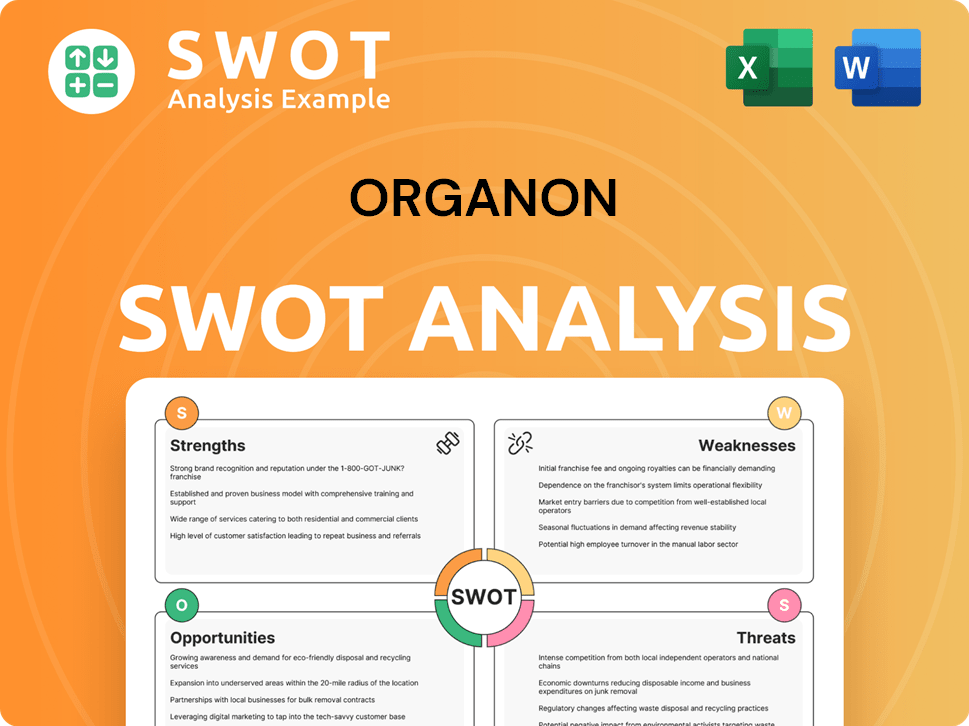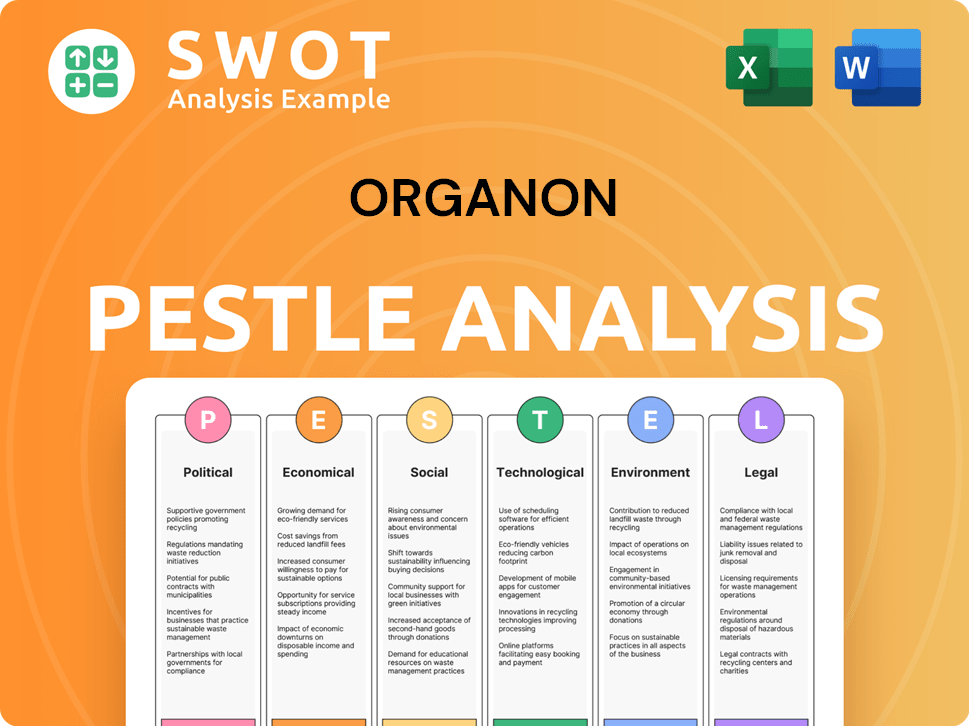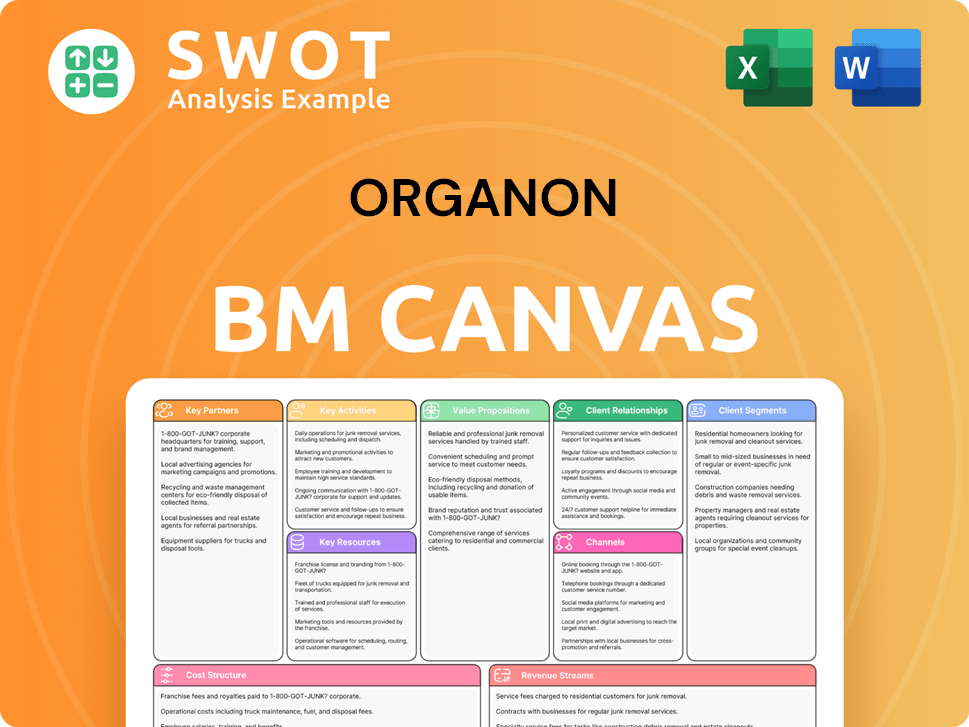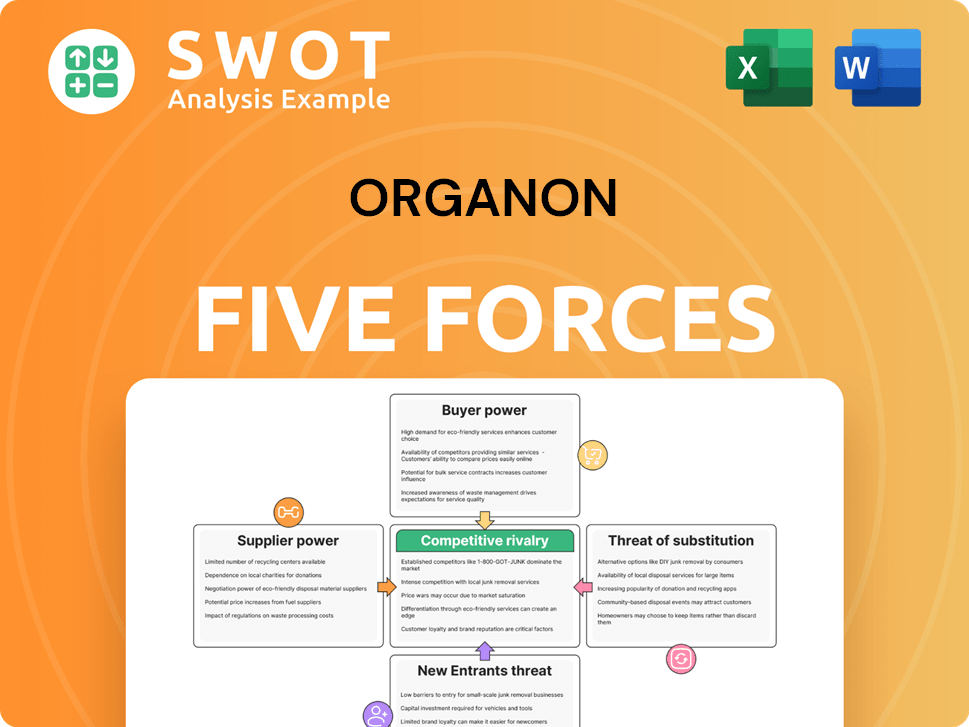Organon Bundle
How Does Organon Stack Up in the Pharmaceutical Arena?
Organon, a prominent player in women's health, has quickly made its mark since its 2021 spin-off from Merck. With a focus on established brands and innovative therapies, Organon aims to lead in areas like contraception and fertility. This strategic shift allows Organon to address unmet needs in a specialized market segment.

To truly understand Organon's position, we must dive into its Organon SWOT Analysis and the dynamics of its competitive landscape. This detailed Organon market analysis will explore its key competitors, dissect its business strategy, and evaluate its strengths and weaknesses within the pharmaceutical industry. By examining Organon's competitive advantages, we can assess its potential for future growth and its ability to navigate challenges in the women's health market. Furthermore, we will analyze Organon's financial performance and its strategies to gain market share.
Where Does Organon’ Stand in the Current Market?
Organon carves out a distinct market position as a global healthcare company, with a primary focus on women's health. The company operates through two main segments: Established Brands and Women’s Health. The Women's Health segment concentrates on products for contraception, fertility, and hormone replacement therapy. The Established Brands segment encompasses a diverse portfolio of off-patent medicines across various therapeutic areas.
The company's market presence is significantly bolstered by the established brands and global reach inherited from Merck. Organon aims to strengthen its leadership in women's health by addressing unmet needs and expanding its product offerings in this specialized area. The company's strategic focus allows it to dedicate resources and expertise to a segment that traditionally receives less attention from larger, diversified pharmaceutical companies. For an in-depth look at their strategic direction, consider exploring the Growth Strategy of Organon.
In 2023, Organon generated $6.2 billion in revenue, with its Women's Health segment contributing $1.8 billion, highlighting its strategic emphasis on this area. This financial performance positions Organon as a substantial player within the pharmaceutical industry, especially when compared to smaller, more niche women's health companies. Organon's significant geographic presence allows it to serve a broad customer base, with operations spanning numerous countries.
Organon's core operations are divided into two main segments: Women's Health and Established Brands. The Women's Health segment focuses on products for contraception, fertility, and hormone replacement therapy. The Established Brands segment includes a diverse portfolio of off-patent medicines.
Organon's value proposition lies in its commitment to women's health and its established portfolio of medicines. The company aims to improve women's health by addressing unmet needs and expanding its product offerings in this specialized area. The company's global reach allows it to serve a broad customer base.
The Organon competitive landscape includes both large pharmaceutical companies and specialized women's health businesses. Key competitors include companies with established women's health franchises and those with a broad portfolio of off-patent medicines.
- Companies like Bayer and Pfizer, which have significant presences in women's health.
- Other pharmaceutical companies with off-patent drugs competing in the Established Brands segment.
- Specialized women's health companies that focus on niche markets.
- Generic drug manufacturers that compete with Organon's established brands.
Organon SWOT Analysis
- Complete SWOT Breakdown
- Fully Customizable
- Editable in Excel & Word
- Professional Formatting
- Investor-Ready Format

Who Are the Main Competitors Challenging Organon?
The Organon competitive landscape is shaped by a diverse group of pharmaceutical and healthcare companies. These competitors range from large, established players to smaller, specialized firms. Understanding this landscape is crucial for Organon's business strategy and its ability to maintain and grow its market share, especially in the women's health and established brands segments.
Organon's market analysis reveals a dynamic environment influenced by factors like pricing pressures, innovative therapies, and the introduction of generics. The company must continually assess its position and adapt to changes, including mergers and acquisitions that can reshape the competitive dynamics. The company's focus on differentiation in women's health, leveraging established brands, and exploring new product development are key strategies.
The competitive environment impacts Organon pharmaceuticals across its two main segments: Women's Health and Established Brands. In the women's health sector, the company faces competition from major pharmaceutical companies and specialized biotech firms. The Established Brands segment competes with numerous generic drug manufacturers and other pharmaceutical companies that market off-patent medicines.
Bayer AG is a significant competitor, particularly with its contraceptive and gynecological therapies. Pfizer Inc. also competes in certain areas within women's health. These companies have established market positions and extensive product portfolios.
Ferring Pharmaceuticals and EMD Serono (a subsidiary of Merck KGaA, Darmstadt, Germany) offer a range of fertility treatments. These companies focus on specialized areas within women's health, providing targeted competition.
Organon competes with numerous generic drug manufacturers and other pharmaceutical companies. This segment faces intense price competition and the constant introduction of generic alternatives.
The pharmaceutical industry is subject to mergers and acquisitions. These changes can reshape the competitive environment, potentially creating new formidable competitors or consolidating market share. The introduction of biosimilars or generics also impacts the market.
Organon focuses on differentiating within women's health and leveraging its established brands. The company also explores new product development and partnerships to maintain its competitive edge. This approach is crucial for navigating the dynamic market.
The company faces challenges from pricing pressures, the introduction of new innovative therapies by rivals, and the entry of biosimilars or generics. These factors necessitate continuous adaptation and strategic agility.
Organon's ability to compete effectively depends on its ability to differentiate its products, manage pricing pressures, and respond to the introduction of new therapies. The company must also consider the impact of mergers and acquisitions and the entry of generics.
- Focus on Women's Health: Prioritize innovation and differentiation in the women's health segment.
- Leverage Established Brands: Maximize the value of existing products and brands.
- Explore New Product Development: Invest in research and development to expand the product portfolio.
- Strategic Partnerships: Form alliances to enhance market reach and product offerings.
- Adaptability: Remain flexible and responsive to changes in the competitive environment.
For more insights into Organon's strategic direction, consider reading about the Growth Strategy of Organon.
Organon PESTLE Analysis
- Covers All 6 PESTLE Categories
- No Research Needed – Save Hours of Work
- Built by Experts, Trusted by Consultants
- Instant Download, Ready to Use
- 100% Editable, Fully Customizable

What Gives Organon a Competitive Edge Over Its Rivals?
The competitive advantages of Organon, a pharmaceutical company, are rooted in its strategic focus, established portfolio, and global infrastructure. A key differentiator is its dedication to women's health, facilitating specialized research, development, and marketing. This contrasts with broader pharmaceutical companies that spread resources across numerous therapeutic areas. This focused approach allows for a deeper understanding of patient needs and targeted innovation.
Organon's competitive edge also stems from its inherited portfolio of established brands, providing a strong revenue base and immediate market presence. This includes key products in contraception and fertility, which benefit from brand recognition and physician familiarity. Moreover, the company's global commercial footprint provides extensive reach into diverse markets, supporting product distribution and sales worldwide. This established infrastructure is a significant asset in a competitive landscape.
Furthermore, Organon's commitment to addressing unmet healthcare needs in women's health positions it favorably. By investing in research and development for underserved conditions, the company can create novel therapies and gain a competitive edge. This focus on innovation within a specific area, combined with its established brands and global reach, allows Organon to leverage its strengths in product development, marketing, and strategic partnerships to maintain and grow its market share. The company's ability to forge partnerships and acquire innovative assets further strengthens its competitive standing.
Organon's primary competitive advantage lies in its singular focus on women's health. This specialization allows for targeted research and development efforts, leading to innovative therapies. This contrasts with diversified pharmaceutical companies, enabling Organon to concentrate resources and expertise.
The company benefits from a robust portfolio of established brands inherited from Merck. This provides a strong revenue base and immediate market presence. Key products in contraception and fertility have strong brand recognition and physician familiarity.
Organon's global commercial infrastructure supports extensive reach into diverse markets. This facilitates the distribution and sales of its products worldwide. The company's established presence in various regions is a significant competitive advantage.
Organon is committed to addressing unmet healthcare needs in women's health. This focus on innovation allows the company to create novel therapies. This strategy helps in gaining a competitive edge and expanding market share.
Organon's strengths include its focused strategy, established product portfolio, and global commercial infrastructure. These factors contribute to its competitive advantage in the pharmaceutical industry. The company's ability to forge partnerships and acquire innovative assets further strengthens its standing.
- Focus on women's health, enabling specialized research and development.
- Established brand recognition and physician familiarity in key product areas.
- Extensive global reach through its commercial footprint.
- Commitment to addressing unmet healthcare needs.
Organon Business Model Canvas
- Complete 9-Block Business Model Canvas
- Effortlessly Communicate Your Business Strategy
- Investor-Ready BMC Format
- 100% Editable and Customizable
- Clear and Structured Layout

What Industry Trends Are Reshaping Organon’s Competitive Landscape?
The pharmaceutical industry, particularly in women's health, is experiencing significant shifts. These changes are driven by technological advancements, evolving regulatory landscapes, and changing consumer preferences. For companies like Organon, understanding and adapting to these trends is crucial for maintaining a strong competitive position. This includes navigating the marketing strategy of Organon.
Organon's success hinges on its ability to capitalize on opportunities while mitigating risks. The company faces intense competition, pricing pressures, and the threat of generics. However, the growing focus on women's health offers avenues for growth through strategic investments and innovative business models.
Technological advancements are transforming drug discovery and patient care. Regulatory changes impact market entry and product commercialization. There is a growing demand for personalized and accessible healthcare, influencing new delivery methods and patient-centric solutions.
The increasing awareness of women's health issues creates a growing market. Expanding the product portfolio through acquisitions and partnerships is beneficial. Digital health platforms and telemedicine integration offer avenues for enhanced patient engagement and broader access to care.
Intensifying competition from new market entrants and aggressive R&D efforts. Pricing pressures and healthcare cost containment initiatives globally. The constant threat of generic and biosimilar competition for Established Brands.
Focusing on pipeline innovation within women's health. Expanding the global footprint and exploring new business models, such as value-based care initiatives. Adapting to trends, capitalizing on opportunities, and mitigating threats are key.
The Organon competitive landscape is dynamic, with key players vying for market share. The company's position in the women's health market is influenced by factors such as product innovation, pricing strategies, and geographic reach. Understanding Organon's competitors and their strategies is essential for effective business planning.
- Market Share: In 2024, the global women's health market was valued at approximately $40 billion. Companies like Bayer, and AbbVie hold significant market shares.
- R&D Spending: Competitors are investing heavily in research and development. Data from 2024 indicates that R&D spending in the women's health sector increased by about 8% year-over-year.
- Product Pipelines: Several competitors have promising products in development, particularly in areas like endometriosis and menopause.
- Acquisitions and Partnerships: Strategic moves, such as acquisitions and partnerships, are common. In 2024, there were over a dozen significant deals in the women's health space.
Organon Porter's Five Forces Analysis
- Covers All 5 Competitive Forces in Detail
- Structured for Consultants, Students, and Founders
- 100% Editable in Microsoft Word & Excel
- Instant Digital Download – Use Immediately
- Compatible with Mac & PC – Fully Unlocked

Related Blogs
- What are Mission Vision & Core Values of Organon Company?
- What is Growth Strategy and Future Prospects of Organon Company?
- How Does Organon Company Work?
- What is Sales and Marketing Strategy of Organon Company?
- What is Brief History of Organon Company?
- Who Owns Organon Company?
- What is Customer Demographics and Target Market of Organon Company?
Disclaimer
All information, articles, and product details provided on this website are for general informational and educational purposes only. We do not claim any ownership over, nor do we intend to infringe upon, any trademarks, copyrights, logos, brand names, or other intellectual property mentioned or depicted on this site. Such intellectual property remains the property of its respective owners, and any references here are made solely for identification or informational purposes, without implying any affiliation, endorsement, or partnership.
We make no representations or warranties, express or implied, regarding the accuracy, completeness, or suitability of any content or products presented. Nothing on this website should be construed as legal, tax, investment, financial, medical, or other professional advice. In addition, no part of this site—including articles or product references—constitutes a solicitation, recommendation, endorsement, advertisement, or offer to buy or sell any securities, franchises, or other financial instruments, particularly in jurisdictions where such activity would be unlawful.
All content is of a general nature and may not address the specific circumstances of any individual or entity. It is not a substitute for professional advice or services. Any actions you take based on the information provided here are strictly at your own risk. You accept full responsibility for any decisions or outcomes arising from your use of this website and agree to release us from any liability in connection with your use of, or reliance upon, the content or products found herein.